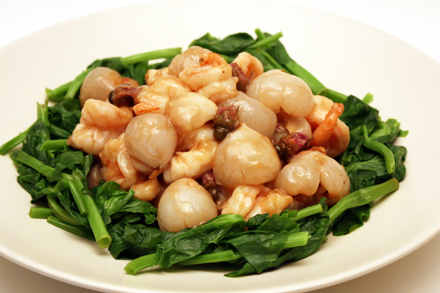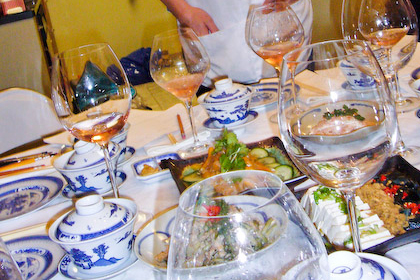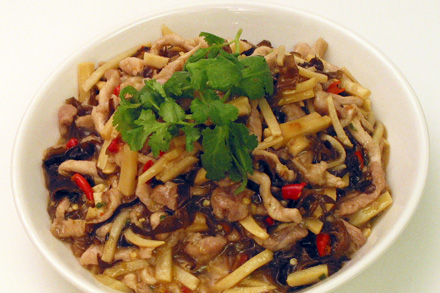Last Wednesday The New York Times published an article by Kim Severson about “Recipe Deal Breakers.” In it she asked if there is an ingredient or a technique that would stop you from using a recipe. The article was humorous and light-hearted, which I enjoyed immensely. However, that didn’t stop a firestorm of reactions from spreading all over the culinary blogosphere. Michael Ruhlman joined in the fray with his blog post the next day. Kate Hopkins at Accidental Hedonist continued the discussion with a poll. Now it’s my turn to ask a similar question. What is a deal breaker for creating authentic Chinese food in an American Kitchen?
While many Chinese and Asian ingredients are becoming more available in the American markets, most are still not quite adequate for reproducing truly authentic dishes from Asia. For some of us living in large cities, such as New York, San Francisco and Los Angeles, we are fortunate to have access to well stock Chinatown markets. Would difficulty in obtaining proper ingredients in other parts of the country be a deal breaker?
How about substitution of ingredients? Certain ingredients in Chinese cooking can be substituted. But is this an acceptable alternative? During the panel discussion at Asia Society last week the very same issue was discussed. One panelist John Nihoff, a professor at the Culinary Institute of America, who is an expert in Korean cooking, strongly believes ingredients should be true to the culture. He insisted that Korean sesame oil imparts distinct flavor when used in Korean cooking. On the other side, Susanna Foo, Executive Chef of the restaurant Susanna Foo’s in Philadelphia, claims she is very comfortable using Kikoman soy sauce from Japan in her Chinese restaurant. For me I like to create recipes that can stay true to the original culinary culture. Substituting less authentic ingredients is a deal breaker for me. What about you?
Chinese cooking techniques are sometimes unfamiliar and intimidating. Deep-frying and high-heat stir-frying for example involves hot splattering oil. Would these techniques discourage you from taking on a recipe?
Of course being without children I can pretty much cook without concern to many issues faced by moms like my neighbor Kim. I can always take time to find rare ingredients and master special techniques whenever necessary. For me there seem to be few deal breakers. Are concerns with your family’s well-being and what they will eat a deal breaker for many recipes?
Many of my recipes are simple Chinese cooking, but a large number require difficult to obtain ingredients and special techniques. Still these recipes are written for you. So write a comment and let me know about your deal breakers.





Hey Kian,
That’s a great topic to think about when considering making foods that are not within your own cultural repertoire. For me (as a mom like Kim) typically I would shy away from recipes that require hard-to-find items UNLESS I was particularly motivated by a special recipe. Then the girl is staying with her dad and I am heading down to Chinatown. Otherwise I really appreciate recipes that are quick with readily available ingredients. Of course there are some special exceptions (like the deep fried bean paste donuts. They were off the hook.) Every once in awhile it is nice to try something new and challenging. It reminds me of my pre-kid days~
M daughter is actually climbing all over me and the computer as I write so I have to go but thanks for keeping in mind all our cooking needs!
Luckily for me living the good life in Melbourne, Australia, there are no deal breakers. We are spoilt for choice with authentic groceries from China, Malaysia, Vietnam, Thailand, Laos, Cambodia, Japan, Indonesia and Korea etc. Locally many things are made fresh including Lup Cheong, salted fish and we can even get pre shredded green papaya, banana flower or mango, Daikon cake and fresh desserts. We also grow fresh Asian vegetables and herbs here and can get all the Asian cuts of meat we want.
When I was a child things were different and my mother taught Cantonese cookery, skillfully adapting recipes along the way. Xiao Xing Wine was replaced with Sherry and Ginger Wine, certain greens were substituted while others were planted in our garden instead. Rock sugar was replaced with cane sugar and she made her own rice flour, five spice powder etc from ingredients sourced at Indian grocery stores.
I’ll draw the line at expensive, rare, endangered ingredients. And anything involving animal blood. (I’m becoming more squeamish as an adult.)
Also because of limited kitchen space, I will object to cooking any whole animal.
I liked Kim’s article too. It was very cheeky.
Thanks for mentioning Moms and the idea that deal breakers are connected to what is going on in your life and also transient (what I cook now won’t be what I’m cooking when the girls are older and going to school, for instance)
I think what was missing from the debate as a whole is your sense of balance and understanding that a home cook can be many things, not just one. Some people in the debate were outrageously rigid and condescending to people not cooking at their level. I like that you have your own extremely high standards (I will not substitute!) – and this is what I love about you and your cooking – but also that you get that those standards might not work for other cooks.
Thanks for your calm, articulate and spot on analysis.
Kim (the mom who lives across the hall)
The only thing that keeps me from cooking something is if I cant get the ingredients no matter what and would have to order online only.
Another thing that would keep me from trying a recipe is the use of animal “blood” in a recipe because my parents don’t consume it for religious reasons and since I live in their household I must respect that when preparing food. (Of course if Im not home I will try it and cook with it)
For me, there are no “deal breakers” for Chinese cooking. I’m fortunate to live in an area with large ethnic Asian populations, so I have many sources – from large Asian supermarkets to tiny neighborhood storefronts – where I can find ingredients and special “tools” if necessary.
The only thing that sometimes slows me down is unfamiliar techniques and the necessity for practice in order to achieve consistent results. One of my family’s favorite appetizers, for example, is scallion pancakes. It took me months of practice to hone the technique down to the point where I could make them as well as the restaurant chef who was kind enough to share his recipe with me.
Dave, I read your scallion pancake post. I love it. I like how you show the techniques visually. Great for novice. The dough for scallion pancake is the same for making dumplings. So I often make a little extra when making dumplings and just make pancake with the leftover.
Read Dave’s scallion pancake post
This is an interesting topic for me. Growing up eating Thai food and having worked at a take out Chinese establishment, it’s no big deal for me to cook Asian foods at home. As a busy parent and the family cook, I find that using techniques like stir-frying are time savers and a great way to incorporate tasty fresh vegetables in meals. As for deep-frying, I’m not shy about that either. Long braises? I sometimes use a pressure cooker. So there really aren’t deal breakers in that regard.
I also think it’s perfectly acceptable to substitute ingredients. I do it all the time. when I was a kid, mom often bought frozen meats and fish at the Asian market. She would never substitute something like salmon when pompano fish is traditionally used. I, on the other hand, have no problem substituting. I would much prefer fresh, quality ingredients over inferior ingredients. With that said, I do often buy imported pastes and sauces, even if I can make them myself.
But there are some things I won’t make/eat. I can not get past the idea of eating bugs. Blood? Offal? Nope.
For me the deal breaker will be “explosive wok” technique”, when the oil burst in flame with a huge fire ball in the wok. I would love to try this, but, sadly, can not do it at home
Yes I agree with your. some ingredients are to buy and some special techniques are hard to learn. maybe this is the reason why many people choose going to chinese restruant instead of cooking it.